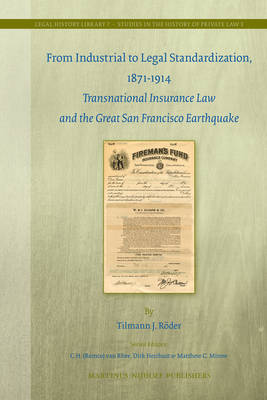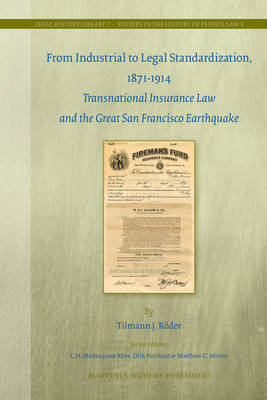
Je cadeautjes zeker op tijd in huis hebben voor de feestdagen? Kom langs in onze winkels en vind het perfecte geschenk!
- Afhalen na 1 uur in een winkel met voorraad
- Gratis thuislevering in België vanaf € 30
- Ruim aanbod met 7 miljoen producten
Je cadeautjes zeker op tijd in huis hebben voor de feestdagen? Kom langs in onze winkels en vind het perfecte geschenk!
- Afhalen na 1 uur in een winkel met voorraad
- Gratis thuislevering in België vanaf € 30
- Ruim aanbod met 7 miljoen producten
Zoeken
From Industrial to Legal Standardization, 1871-1914
Transnational Insurance Law and the Great San Francisco Earthquake
Tilmann Röder
€ 222,95
+ 445 punten
Omschrijving
At the end of the 19th century, internationalisation and standardisation fundamentally changed business law. More and more industries such as insurance, transport, wholesale and finance used standard contracts and clauses for international transactions. An impressive example of this development was the reaction of the insurance industry to the earthquake and inflagration of San Francisco in 1906. At once, a global discourse on the economic, technical and legal consequences arose; in the meantime, a small group of powerful reinsurance managers developed a strict exclusionary clause intended for worldwide application. Fire insurers in many countries adopted this "earthquake clause", while others refused it. Germany, California and Italy - where the earthquake of Messina in 1908 led to a legal turn - are paradigmatic examples of these reactions. Beyond this case study, the author discusses the novel phenomenon of international standard contracts and clauses from a theoretical perspective.
Specificaties
Betrokkenen
- Auteur(s):
- Uitgeverij:
Inhoud
- Aantal bladzijden:
- 368
- Taal:
- Engels
- Reeks:
- Reeksnummer:
- nr. 7
Eigenschappen
- Productcode (EAN):
- 9789004212374
- Verschijningsdatum:
- 25/11/2011
- Uitvoering:
- Hardcover
- Formaat:
- Genaaid
- Afmetingen:
- 168 mm x 244 mm
- Gewicht:
- 725 g

Alleen bij Standaard Boekhandel
+ 445 punten op je klantenkaart van Standaard Boekhandel
Beoordelingen
We publiceren alleen reviews die voldoen aan de voorwaarden voor reviews. Bekijk onze voorwaarden voor reviews.









